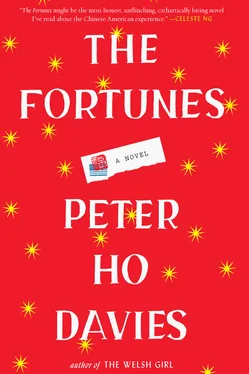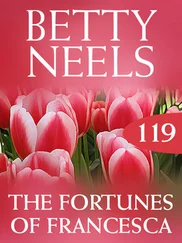Horse walks into a bar — You know this one? — and the bartender asks, “Why the long face?”
Yeah? How about this one?
Two Chinamen walk into a bar and the barkeep goes, “Why the same face?”
Okay. But we weren’t the same. That’s my point. That’s what got him killed.
On the one hand, he was more Chinese than me and most of the other Chinese American kids I knew. He was born there — the mainland, not Taiwan, like my parents — lived there until he was six before he was adopted (itself pretty rare back then), didn’t even speak English in first grade. Then again, his parents didn’t live in or around Chinatown like most of ours. They were in Highland Park, with no Chinese neighbors. Oh, they came to Chinatown to do their shopping every weekend — I’d see him around, knew who he was — but Highland Park was where he lived, where he went to school. With white kids. Poles, Irish, Italians. (This was before the riots, white flight.) So he was always more at ease with them, more at ease with them than we were, for sure, but also maybe more at ease with them than with us. That’s where he met Mike and Jerry, in grade school. I only knew him well in high school; they always had that first claim on him (the three of them had gone to see the Grand Prix a couple of weeks earlier — they were still talking about it in the car that night, Mike goofing on grand pricks. I hadn’t been asked).
It’s one reason Vincent liked the Fancy Pants, even though it was a rat hole — an old grindhouse with rows of movie seats still in back and the girls up onstage beneath the peeling gilt proscenium. It meant he got to go back to Highland Park, back home (his mother remembered seeing Flower Drum Song there when it was still a respectable joint). He’d always hated having to leave. Driven out, as he saw it. His dad had been mugged, so they’d moved to the suburbs and Vincent had finished high school there. They traded a third-floor walkup for a nice little ranch with a carport and scalloped aluminum awnings two blocks over from ours.
We’d been in Oak Park for five years by then, my father and me. He owned a grocery in Chinatown but made his fortune from a sideline. He’d always stocked a few rice cookers, but on a whim he tried some pocket transistor radios from the same Japanese suppliers, just as the market for them took off (this was Motown in the sixties, after all). I can still remember his suspicion when white and black teens started coming in for them. A few years later he ditched the bok choy and the scallions for good and relocated the electronics business to the Westland mall, where he cashed in on early video game consoles, Walkmans, and VCRs. But he’d already moved us from the apartment over the grocery store a couple of months after the riots in ’67.
My father talked about Oak Park like it was the promised land. But it never sat well with Vincent. “Can’t sleep right,” he complained; he missed the shush of traffic at night. Really, it felt like running away, I think. He didn’t blame his dad — Mr. Chin was an older guy, in his sixties by then — but Vincent always figured he’d have fought back if it were him. You could say he’d been spoiling for that fight for years.
Irony is, he was a great runner. That was his thing in high school — track. I was heavy as a kid, shy in the cafeteria, so I’d take my lunch on the bleachers, watch him doing his laps. I told him running suited his name, and he looked at me blankly. Vincent, I said, means winner. He liked that, as I hoped he would, but it surprised me he hadn’t known. Then again, he went by Vince, at school at least, itself unusual among us, our boys’ names, even in English, often echoing the two syllables of a Chinese name: Roland or Robin, Henry or Melvin, Eddie or Peter, like me (I even knew a Nixon once). Myself, I used to call him “InVince,” because he was invincible, I told him, but also because he was in , in a way I never could be. Really I knew “Vince” just meant American.
On the wedding invitation it was “Vincent” in embossed italics. Vincent and Victoria. Both winners. Vicki and Vince, to their friends. As a couple they couldn’t have sounded more all-American. They were planning two ceremonies; Vicki had two dresses picked out, one Chinese, one Western. When I asked him that night how the preparations were going, he told me his mother was arguing with Vicki over guests throwing rice. “She says Chinese don’t waste food, still remembers going hungry during the war.” The wedding was planned for a Monday, when all the Chinese restaurants were closed, so that everyone could attend. Afterward they had tickets for Aruba.
His middle name was Jen, though I only learned it when he died. He never used it, and it only shows as J. on his gravestone. I had to ask what it stood for. Jen: the great Confucian virtue of doing unto others as you’d have them do unto you.
What do I remember? What do you?
If you remember the case at all, if you’re Asian American, say, you might recall that the killers, Evans and Pitts, father and stepson (and what father takes his stepson to a strip club?), pleaded manslaughter. It was just a barroom brawl gone wrong, heat-of-the-moment stuff — an honest mistake! — never mind it took them thirty minutes to hunt Vincent down. The victim had thrown the first punch, after all. They got off with probation and fines of $3000 each. Plus court costs.
Less than the price of a used car, people said.
Maybe you remember that the judge had been in a Japanese POW camp during the war.
Remember when Chinese couldn’t testify against whites? people said, as if it were yesterday and not a hundred years ago.
It was Vincent’s idea. He told me to run. Only he didn’t say run. He said, “Scram.” It was the last word I heard from him in English, so I’ve given it a lot of thought. Scram. It’s what you say to a kid, isn’t it? A nuisance. Or maybe what naughty kids say to each other after they ring a doorbell. Scram. Not run. He was a runner. Running to him meant winning. Running toward something. Scram, I think, meant running away. If he’d said run we might both have run, but scram was for me. Because he didn’t scram. He waited for them. He could have gotten away. When Evans hopped out of the car — a Plymouth, for the record — it was still moving. It ran over his foot, for god’s sake! It was the Keystone Klan out there! You think Vincent couldn’t have outrun these guys? He lettered in track. But he was done running. He started it at the club, after all. He would have fought in the gravel and dog-shit parking lot outside too if Evans hadn’t gone for the bat. He wanted to fight them. Maybe he figured he could make Evans drop the bat, shame him into a fair fight. Maybe he figured just two on one they wouldn’t feel they needed the bat.
This was on Woodward, under the golden arches there, fluorescent tubes in the sign humming like cicadas.
I didn’t run far. To the edge of the light. Just far enough to live, just far enough to watch.
Scram! Who was he to tell me to scram? Who was I to listen?
He was grappling with Pitts when Evans caught him across the knees, as if reaching for a grounder, after which Vincent couldn’t have run even if he’d wanted. Then a line drive to the chest— pop! — as he went down, two more to the head when he was on all fours. Swinging for the fences.
I ran back, but too late. Before or after the two off-duty cops working security at the Mickey D’s drew on Evans? You might wonder. Me too.
Vincent’s last words—“It’s not fair”—to me, in Chinese, while I cradled his ruined head, blood bubbling from his mouth and nose as he spoke, blood pouring from his ears like oil. His skull felt like rotten fruit. I thought I’d pissed myself, but the warm wetness in my lap was his brains.
Читать дальше












